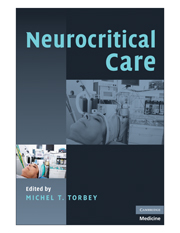Book contents
- Frontmatter
- Contents
- Contributors
- Foreword
- Introduction
- SECTION I PRINCIPLES OF NEUROCRITICAL CARE
- SECTION II NEUROMONITORING
- SECTION III MANAGEMENT OF SPECIFIC DISORDERS IN THE NEUROCRITICAL CARE UNIT
- 10 Ischemic Stroke
- 11 Intracerebral Hemorrhage
- 12 Cerebral Venous Thrombosis
- 13 Subarachnoid Hemorrhage
- 14 Status Epilepticus
- 15 Nerve and Muscle Disorders
- 16 Head Trauma
- 17 Encephalopathy
- 18 Coma and Brain Death
- 19 Neuroterrorism and Drug Overdose
- 20 Central Nervous System Infections
- 21 Spinal Cord Injury
- 22 Postoperative Management in the Neurosurgical Critical Care Unit
- 23 Ethical and Legal Considerations in Neuroscience Critical Care
- SECTION IV MANAGEMENT OF MEDICAL DISORDERS IN THE NEUROCRITICAL CARE UNIT
- Index
- Plate section
22 - Postoperative Management in the Neurosurgical Critical Care Unit
from SECTION III - MANAGEMENT OF SPECIFIC DISORDERS IN THE NEUROCRITICAL CARE UNIT
Published online by Cambridge University Press: 27 April 2010
- Frontmatter
- Contents
- Contributors
- Foreword
- Introduction
- SECTION I PRINCIPLES OF NEUROCRITICAL CARE
- SECTION II NEUROMONITORING
- SECTION III MANAGEMENT OF SPECIFIC DISORDERS IN THE NEUROCRITICAL CARE UNIT
- 10 Ischemic Stroke
- 11 Intracerebral Hemorrhage
- 12 Cerebral Venous Thrombosis
- 13 Subarachnoid Hemorrhage
- 14 Status Epilepticus
- 15 Nerve and Muscle Disorders
- 16 Head Trauma
- 17 Encephalopathy
- 18 Coma and Brain Death
- 19 Neuroterrorism and Drug Overdose
- 20 Central Nervous System Infections
- 21 Spinal Cord Injury
- 22 Postoperative Management in the Neurosurgical Critical Care Unit
- 23 Ethical and Legal Considerations in Neuroscience Critical Care
- SECTION IV MANAGEMENT OF MEDICAL DISORDERS IN THE NEUROCRITICAL CARE UNIT
- Index
- Plate section
Summary
Advances in neurosurgery and anesthesia have dramatically reduced intraoperative morbidity and mortality rates over the past several years. A significant part of the care of the neurosurgical patient, however, occurs postoperatively in the neurosurgical critical care unit (NCCU). The goal of care in a monitored environment during this time is to prevent and treat, in a timely fashion, potential early and often fatal complications of both surgery and anesthesia. This requires a team of highly trained specialists that may include neurosurgeons, anesthesiologists, neurointensivists, and nurses. Consultants and family members also play key roles in the management of the neurosurgical patient.
GENERAL CONSIDERATIONS
Greater than 90% of postoperative patients admitted to NCCUs pass through uneventfully and in general spend <24 hours in this monitored setting. Most complications occur within the first 24–48 hours after surgery and early detection can lead to quick and efficient remedies. Postoperative complications can be divided into those related to the effects of anesthesia in the context of the patient's premorbid medical conditions and those related to their neurosurgical disease. The most critical part of NCCU care is the ability to recognize and differentiate expected postoperative changes in clinical condition from those that are unexpected. To achieve this, there needs to be a clear understanding of the patient's baseline medical condition, neurosurgical disease, and operative procedure.
▪ A thorough medical and surgical history should be obtained by the admitting physician including a review of the medical record, especially if the patient is slow to recover from anesthesia. Many times family members are also a reliable source of information.
[…]
- Type
- Chapter
- Information
- Neurocritical Care , pp. 294 - 307Publisher: Cambridge University PressPrint publication year: 2009



